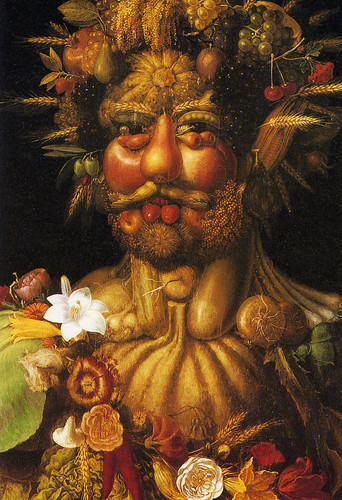
An artist I’ve become fascinated with—though I can’t say I love (or even particularly like) his work—is Giuseppe Arcimboldo. The Italian mannerist was a student of Da Vinci’s, and it shows. His technique is brilliant, his talent undeniable. I don’t know how he’s perceived in the art world, but among the general public, I’d say he’s relatively obscure (though his works hang in the Louvre). I'm sure anyone schooled in the art of the Renaissance who happens to read this will laugh--and you should!

Arcimboldo's paintings are incredibly detailed, and in terms of context, content, etc., I think he was way ahead of his time—more than five centuries ahead of his time. His portraits of people are “made” entirely of plants, animals, fruits, vegetables, and trees. His paintings have universal themes and one-word names; for instance, his allegorical and/or symbolic depictions of the four seasons and elements (i.e., "Water," "Earth").
Because a fish is a fish, a crab is a crab, and an apple is an apple, regardless of the century in which it’s portrayed, Arcimboldo’s paintings have a timeless—even contemporary—quality. LSD in the Reanissance? Apparently so! None of my friends has heard of this man; all to whom I’ve shown his work have been intrigued, perplexed, impressed, and/or amused.
Personally, I think Arcimboldo is ripe for a comeback. All it will take is some deep-pocketed Hollywood producer to think this artist is a master—or, more likely, smell an untapped money-making niche—so he can make a big-budget flick about him, go on a PR tour for the cause, pretend to be an expert, and tell the rest of us lowly commoners about the unsung master of the Renaissance we’ve all been missing.
If you're a producer or director and you're not quite sure if Arcimboldo's marketable enough, consider this: he was also the hottest party planner of his day, planning shindigs for the Milanese upper crust. Too bad he wasn't English; since Hollywood thinks all Americans like our culture spoon-fed to us in corny, rhyming sound-bites, you could call him the Elizabethan Era David Tutera.
In the meantime, check out some of his humorous and mildly disturbing pieces.





No comments:
Post a Comment